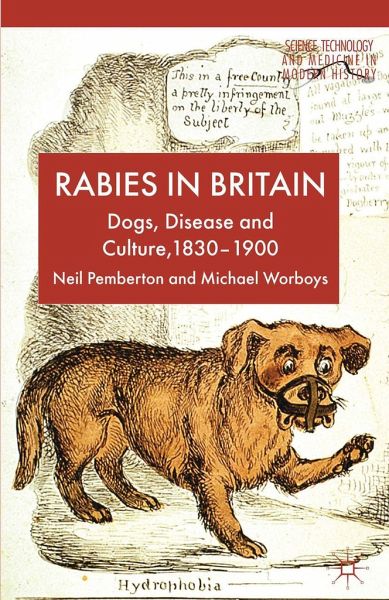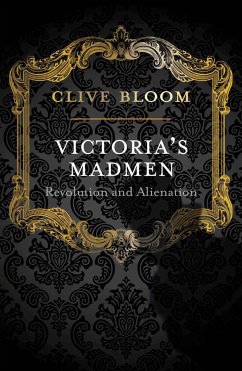
Versandkostenfrei!
Versandfertig in 6-10 Tagen
Weitere Ausgaben:

PAYBACK Punkte
19 °P sammeln!





Rabies was a constant threat in Victorian Britain and gripped popular imagination, not least because its human form, hydrophobia, produced a vile death with the mind and body out of control. This book explores the changing understanding of rabies amongst veterinarians, animal welfare campaigners, state officials, politicians and the public.
NEIL PEMBERTON is a Research Associate in the Centre for the History of Science, Technology and Medicine and Wellcome Unit for the History of Medicine at the University of Manchester, UK. He works on the history of deaf education and deaf people in Victorian England. He is currently writing a book on the history of noise in the Twentieth century. MICHAEL WORBOYS is Director of the Centre for the History of Science, Technology and Medicine and Wellcome Unit for the History of Medicine at the University of Manchester, UK. He has worked on the history of science and imperialism, tropical medicine, and bacteriology. His recent publications include Spreading Germs: Disease Theories and Medical Practice in Britain, 1865-2000 and, with Sanjoy Bhattacharya and Mark Harrison, Fractured States: Smallpox, Public Health and Vaccination Policy in British India, 1800-1947.
Produktdetails
- Science, Technology and Medicine in Modern History
- Verlag: Palgrave Macmillan / Palgrave Macmillan UK / Springer Palgrave Macmillan
- Artikelnr. des Verlages: 978-1-137-28589-8
- 2007
- Seitenzahl: 247
- Erscheinungstermin: 17. Oktober 2007
- Englisch
- Abmessung: 213mm x 136mm x 20mm
- Gewicht: 308g
- ISBN-13: 9781137285898
- ISBN-10: 1137285893
- Artikelnr.: 36196568
Herstellerkennzeichnung
Libri GmbH
Europaallee 1
36244 Bad Hersfeld
gpsr@libri.de
'Rabies is both rare and highly emotive. Pemberton and Worboys use this unusual combination to produce a stunning history of the disease, in which human beings and dogs have equal parts to play. The authors offer a success story, but a peculiarly British one, in which pet lovers, antivivisectionists and individualists do battle against the State, veterinarians, and medical scientists. They show that the issues were never clear-cut, and their dispassionate analysis develops a rich and evocative narrative which is enriched by a series of brilliantly chosen illustrations. This is the social history of medicine at its very best.' - W. F. Bynum, University College London, UK
'Essential reading for anyone interested in British anxieties
'Essential reading for anyone interested in British anxieties
Mehr anzeigen
and preoccupations about health, dogs, class and gender domination, and the state as protector from nature's threats. This is a lively and compelling account of how Britons created different visions of rabies at different times - from the horrors of hydrophobia, through germ theories, quarantines, and "Pet Passports"'. - Susan D. Jones, University of Minnesota, USA
'This energetic, engaging and well-crafted study offers a textured account of professional, popular and state responses to rabies, demonstrating how dread of 'Canine Madness' revealed a great deal about the society from which it emerged. This riveting book makes an original and important contribution to the history of medicine and social and cultural history of Britain.' - Hilary Marland, University of Warwick, UK
'This is a gem of a book, full of fascinating nuggets, clearly written and extensively referenced, with an impressive array of illustrative material and quotes, which generate a vivid sense of atmosphere and attitudes. Furthermore, it has enormous contemporary relevance for the global control and elimination of dog rabies. All in all, a highly recommended read that should appeal to vets, medics, animal welfarists and historians alike.' - Sarah Cleaveland, The Veterinary Record
'This book displays many of the positive qualities and some of the limitations of the kind of social history which has developed in Britain since Walton's early work on rabies in England. The authors are two respected medical historians who succeed in providing a careful analysis of the social setting in which scientific investigations were conducted in the 19th and 20th centuries.' - Joseph Melling, Reviews in History
'This excellent book is a must for any veterinary practice or medical library...This book will not only be of interest to veterinary surgeons, doctors, nurses and veterinary nurses, but to anyone who is interested in the history of rabies.' - Heather Briggs, Veterinary Times
Commended in the Basis of Medicine category of the 2008 BMA Medical Book Competition.
'This is an excellent history, well-written in a style of interest to professional and clinical historians alike.' - BMA Medical Book Competition Committee
'Mad Dogs and Englishmen is a trove of fascinating material on a very diverse range of topics...It is crisply and compellingly written.' - Seamus Sweeney, The Times Literary Supplement
'Pemberton and Worboys have written a fascinating chronicle of the vicissitudes in the understanding and treatment of rabies over the last two centuries. And since rabies loomed large in British consciousness, even when it was rare on the ground, they have also illuminated a range of larger issues in the history of medicine, public health and the relation of people to other animals.' - Harriet Ritvo, Massachusetts Institute of Technology, British Journal for the History of Science
'This energetic, engaging and well-crafted study offers a textured account of professional, popular and state responses to rabies, demonstrating how dread of 'Canine Madness' revealed a great deal about the society from which it emerged. This riveting book makes an original and important contribution to the history of medicine and social and cultural history of Britain.' - Hilary Marland, University of Warwick, UK
'This is a gem of a book, full of fascinating nuggets, clearly written and extensively referenced, with an impressive array of illustrative material and quotes, which generate a vivid sense of atmosphere and attitudes. Furthermore, it has enormous contemporary relevance for the global control and elimination of dog rabies. All in all, a highly recommended read that should appeal to vets, medics, animal welfarists and historians alike.' - Sarah Cleaveland, The Veterinary Record
'This book displays many of the positive qualities and some of the limitations of the kind of social history which has developed in Britain since Walton's early work on rabies in England. The authors are two respected medical historians who succeed in providing a careful analysis of the social setting in which scientific investigations were conducted in the 19th and 20th centuries.' - Joseph Melling, Reviews in History
'This excellent book is a must for any veterinary practice or medical library...This book will not only be of interest to veterinary surgeons, doctors, nurses and veterinary nurses, but to anyone who is interested in the history of rabies.' - Heather Briggs, Veterinary Times
Commended in the Basis of Medicine category of the 2008 BMA Medical Book Competition.
'This is an excellent history, well-written in a style of interest to professional and clinical historians alike.' - BMA Medical Book Competition Committee
'Mad Dogs and Englishmen is a trove of fascinating material on a very diverse range of topics...It is crisply and compellingly written.' - Seamus Sweeney, The Times Literary Supplement
'Pemberton and Worboys have written a fascinating chronicle of the vicissitudes in the understanding and treatment of rabies over the last two centuries. And since rabies loomed large in British consciousness, even when it was rare on the ground, they have also illuminated a range of larger issues in the history of medicine, public health and the relation of people to other animals.' - Harriet Ritvo, Massachusetts Institute of Technology, British Journal for the History of Science
Schließen
Für dieses Produkt wurde noch keine Bewertung abgegeben. Wir würden uns sehr freuen, wenn du die erste Bewertung schreibst!
Eine Bewertung schreiben
Eine Bewertung schreiben
Andere Kunden interessierten sich für











